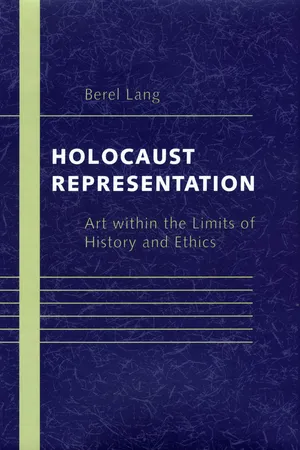
- English
- ePUB (mobile friendly)
- Available on iOS & Android
About this book
Since Theodor Adorno's attack on the writing of poetry "after Auschwitz," artists and theorists have faced the problem of reconciling the moral enormity of the Nazi genocide with the artist's search for creative freedom. In Holocaust Representation, Berel Lang addresses the relation between ethics and art in the context of contemporary discussions of the Holocaust. Are certain aesthetic means or genres "out of bounds" for the Holocaust? To what extent should artists be constrained by the "actuality" of history—and is the Holocaust unique in raising these problems of representation?
The dynamics between artistic form and content generally hold even more intensely, Lang argues, when art's subject has the moral weight of an event like the Holocaust. As authors reach beyond the standard conventions for more adequate means of representation, Holocaust writings frequently display a blurring of genres. The same impulse manifests itself in repeated claims of historical as well as artistic authenticity. Informing Lang's discussion are the recent conflicts about the truth-status of Benjamin Wilkomirski's "memoir" Fragments and the comic fantasy of Roberto Benigni's film Life Is Beautiful. Lang views Holocaust representation as limited by a combination of ethical and historical constraints. As art that violates such constraints often lapses into sentimentality or melodrama, cliché or kitsch, this becomes all the more objectionable when its subject is moral enormity. At an extreme, all Holocaust representation must face the test of whether its referent would not be more authentically expressed by silence—that is, by the absence of representation.
Frequently asked questions
- Essential is ideal for learners and professionals who enjoy exploring a wide range of subjects. Access the Essential Library with 800,000+ trusted titles and best-sellers across business, personal growth, and the humanities. Includes unlimited reading time and Standard Read Aloud voice.
- Complete: Perfect for advanced learners and researchers needing full, unrestricted access. Unlock 1.4M+ books across hundreds of subjects, including academic and specialized titles. The Complete Plan also includes advanced features like Premium Read Aloud and Research Assistant.
Please note we cannot support devices running on iOS 13 and Android 7 or earlier. Learn more about using the app.
Information
Table of contents
- Cover
- Title Page
- Copyright Page
- Dedication
- Contents
- Preface and Acknowledgments
- Introduction: Art within the Limits
- I | Image and Fact:
- II | Eye and Mind: Reflecting the Holocaust
- Index
- Footnotes